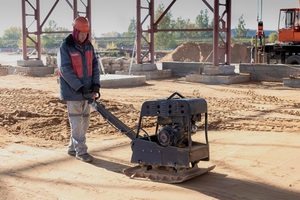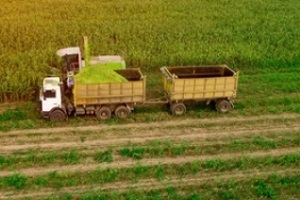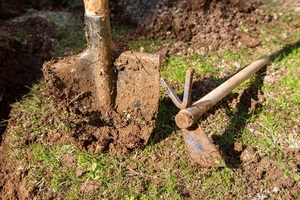 One problem that can have a big impact on a garden is soil compaction. Although it may be less obvious than garden pests and drought, this difficult-to-detect problem can quietly wreak havoc on your gardening efforts before you realize something is amiss. Here is a closer look at what soil compaction entails and some of the common causes behind it.
One problem that can have a big impact on a garden is soil compaction. Although it may be less obvious than garden pests and drought, this difficult-to-detect problem can quietly wreak havoc on your gardening efforts before you realize something is amiss. Here is a closer look at what soil compaction entails and some of the common causes behind it.
What Is Soil Compaction?
Soil compaction is what occurs when the voids that are typically found between particles in soil have been removed. This can happen when pressure or weight collapses the air pockets that normally exist between your soil’s components. When soil is compressed, its density becomes greater, and each liter of soil will weigh more when its pores are compressed.
In some cases, soil compaction is caused intentionally using mechanical methods in order to give the soil more strength to serve as a base for construction projects such as pavements and roads. Failing to compact soil on a construction site can lead to serious problems down the line. For example, if the soil settles down beneath the load of what has been constructed over it, its bearing capacity can drop. It may also slide downward and enable water to get under the surface of the foundation, eventually creating uplift pressure that could lead the building to collapse. Roads built over improperly compacted soil could eventually settle and crack.
Soil compaction may be useful in construction applications, but when it comes to your garden, it is problematic. To understand this better, imagine pouring water on a solid surface, like a stone countertop. Then imagine what would happen if you poured the same amount of water on a sponge. Compacted soil is like the countertop; the water will simply collect on top or roll off rather than absorbing into the dirt to keep your soil in optimal condition for plant growth.
Soil that is too compacted in a garden can make it difficult, if not impossible, for plants to access the nutrients, oxygen and water they need to bring in from the soil through their roots to thrive. Moreover, when roots cannot move through the soil vertically, they will grow horizontally with shallow root systems that prevent them from getting the nutrients they need and potentially compromising the plants nearby. In addition, seedlings may not have the strength to push their way through compacted soil and will be unable to get the sunlight needed for growth.
Common Causes Of Soil Compaction
Here is a look at some of the most common causes of soil compaction.
Wheel Traffic
 One of the major causes of soil compaction on farms is wheel traffic. Many farms rely on equipment like tractors to help carry out time-sensitive operations efficiently. However, as tractor weights have risen over the years, their effect on soil has only gotten worse as the increased weight leads to greater soil compaction.
One of the major causes of soil compaction on farms is wheel traffic. Many farms rely on equipment like tractors to help carry out time-sensitive operations efficiently. However, as tractor weights have risen over the years, their effect on soil has only gotten worse as the increased weight leads to greater soil compaction.
It is particularly common in the springtime that spring planting is typically done before the soil is dry enough to support heavy farm equipment. Confining traffic to areas between rows can help prevent this from occurring.
Rain
The impact of raindrops hitting the soil is a natural cause of compaction that can be observed as a thin soil crust that can stop seedlings from emerging. Although it does not lead to deep compaction, it can still be problematic. This is easy to alleviate with rotary hoeing.
Foot Traffic
A common cause of soil compaction in home gardens is foot traffic. This may occur in areas where children often play or pets walk repeatedly, for example. Likewise, if a home gardener constantly stands in the same area of the garden, the soil will become compacted due to their weight and pressure.
Compactor Tools
In cases where soil compaction is desired, compactor tools can get the results you seek. A smooth roller uses static pressure to compact soil, and vibration and impact may also be used to enhance its effects. There are also padfoot and tamping foot rollers that rely on manipulative force to break the natural bonds between soil particles to facilitate compaction in cohesive soils. Pneumatic rollers with staggered rubber tires of varying pressure can be used for small to medium soil compaction jobs, while rammers may be used to densify soil in a confined zone.
How To Prevent Soil Compaction In Your Garden
Here are a few ways that you can prevent soil compaction in your home garden.
Avoid Walking On Garden Beds
Because weight is a major cause of soil compaction, you will want to avoid walking across your garden beds or standing in areas of the garden where you plan to grow plants. You can create garden paths to confine the traffic to one specific area where you do not plan to plant anything. Stepping stones or walking paths can be used to delineate the area where it is safe to walk.
You will also want to plan the size of your garden beds so that it will not be necessary to walk or stand inside of them. If you are going to add a walking path to either side of the bed, keep the garden bed’s width below 4 feet so that you can reach the middle when you are standing to either side of it without stepping into the bed itself.
Tilling
 If soil in your garden is already compacted, you may be able to regenerate it by tilling the surface or breaking it up with a shovel and then spreading high-quality worm castings or compost across the surface several inches thick. Then, cover this layer with a few inches of mulch and make sure the area gets plenty of water each week.
If soil in your garden is already compacted, you may be able to regenerate it by tilling the surface or breaking it up with a shovel and then spreading high-quality worm castings or compost across the surface several inches thick. Then, cover this layer with a few inches of mulch and make sure the area gets plenty of water each week.
Get In Touch With The Soil Experts
For any home or gardening project involving soil, get in touch with the Northern Virginia soil experts at Dirt Connections. Our experienced team can supply residential and commercial projects with the right type of soil for any type of project and deliver it to your site for a reasonable price.
Summary

Dirt Connections was started with one goal in mind: providing quality residential and commercial construction services to clients on time and on budget. Reach out for more information on how we can support your next project.
For your convenience our estimates are free and by appointment. Call 703-940-9949 for a free estimate today!









































